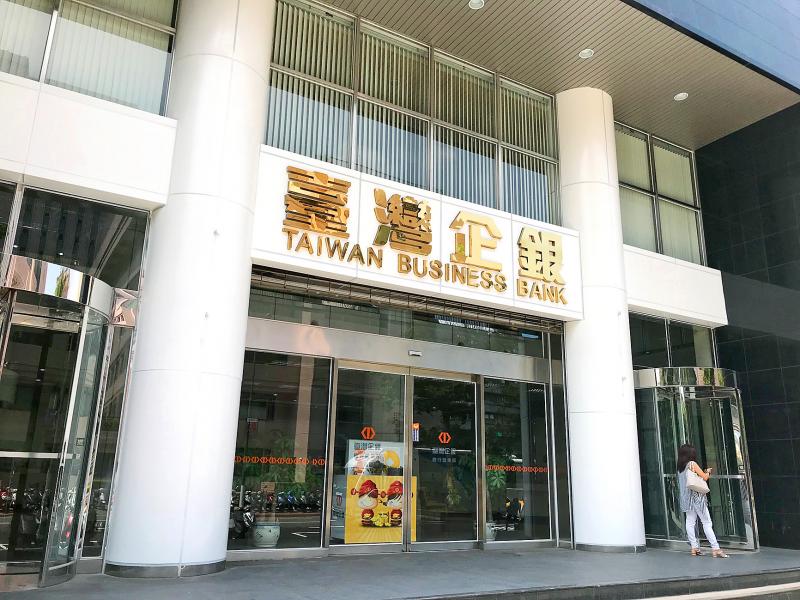Taiwan Business Bank (台灣企銀) yesterday said it is seeking to improve profitability this year by expanding loans to small and medium enterprises (SMEs) and overseas operations as they generate higher margins.
The state-run lender made the announcement after posting NT$2.12 billion (US$72.74 million) in net income for the first quarter — its highest in two-and-a-half years — or earnings per share of NT$0.27.
The lender’s efforts to enhance asset quality and diversify sources of income have started to pay off, bank officials told an online investors’ conference, adding that increases in wealth management and fee income helped offset losses linked to volatile financial markets.

Photo: Chen Mei-ying, Taipei Times
The uptrend is expected to continue for the rest of this year, benefiting from monetary tightening cycles at home and abroad, the officials said.
As of March, lending to small and medium-sized enterprises totaled NT$66.85 billion, an increase of 10.04 percent from a year earlier, they said, adding that the business would continue to provide momentum to loan growth this year.
Interest spread widened from 1.31 percent in March to 1.42 percent last month, following the central bank’s interest rate hike of 25 basis points on March 17, the officials said.
The gap would increase if the central bank raises interest rates later this year, in line with global peers, they added.
Taiwan Business Bank said it would hold mortgage operations steady by focusing on first-home buyers and people with real demand, while supporting selective credit controls on multiple-home mortgages.
Banks intent on active mortgage lending would have to demonstrate higher capital adequacy to meet stricter risk requirements.
Taiwan Business Bank said it would also work toward improving business at its branches in Australia, China, Hong Kong and the US, with the aim of boosting their revenue contributions to 20 percent this year.

‘SWASTICAR’: Tesla CEO Elon Musk’s close association with Donald Trump has prompted opponents to brand him a ‘Nazi’ and resulted in a dramatic drop in sales Demonstrators descended on Tesla Inc dealerships across the US, and in Europe and Canada on Saturday to protest company chief Elon Musk, who has amassed extraordinary power as a top adviser to US President Donald Trump. Waving signs with messages such as “Musk is stealing our money” and “Reclaim our country,” the protests largely took place peacefully following fiery episodes of vandalism on Tesla vehicles, dealerships and other facilities in recent weeks that US officials have denounced as terrorism. Hundreds rallied on Saturday outside the Tesla dealership in Manhattan. Some blasted Musk, the world’s richest man, while others demanded the shuttering of his

ADVERSARIES: The new list includes 11 entities in China and one in Taiwan, which is a local branch of Chinese cloud computing firm Inspur Group The US added dozens of entities to a trade blacklist on Tuesday, the US Department of Commerce said, in part to disrupt Beijing’s artificial intelligence (AI) and advanced computing capabilities. The action affects 80 entities from countries including China, the United Arab Emirates and Iran, with the commerce department citing their “activities contrary to US national security and foreign policy.” Those added to the “entity list” are restricted from obtaining US items and technologies without government authorization. “We will not allow adversaries to exploit American technology to bolster their own militaries and threaten American lives,” US Secretary of Commerce Howard Lutnick said. The entities

Minister of Finance Chuang Tsui-yun (莊翠雲) yesterday told lawmakers that she “would not speculate,” but a “response plan” has been prepared in case Taiwan is targeted by US President Donald Trump’s reciprocal tariffs, which are to be announced on Wednesday next week. The Trump administration, including US Secretary of the Treasury Scott Bessent, has said that much of the proposed reciprocal tariffs would focus on the 15 countries that have the highest trade surpluses with the US. Bessent has referred to those countries as the “dirty 15,” but has not named them. Last year, Taiwan’s US$73.9 billion trade surplus with the US

Prices of gasoline and diesel products at domestic gas stations are to fall NT$0.2 and NT$0.1 per liter respectively this week, even though international crude oil prices rose last week, CPC Corp, Taiwan (台灣中油) and Formosa Petrochemical Corp (台塑石化) said yesterday. International crude oil prices continued rising last week, as the US Energy Information Administration reported a larger-than-expected drop in US commercial crude oil inventories, CPC said in a statement. Based on the company’s floating oil price formula, the cost of crude oil rose 2.38 percent last week from a week earlier, it said. News that US President Donald Trump plans a “secondary